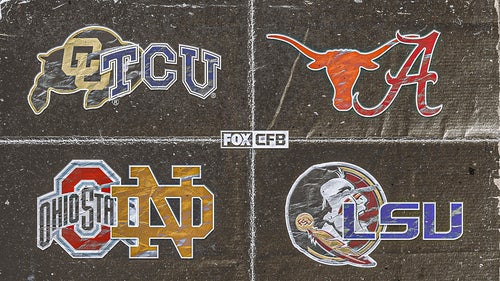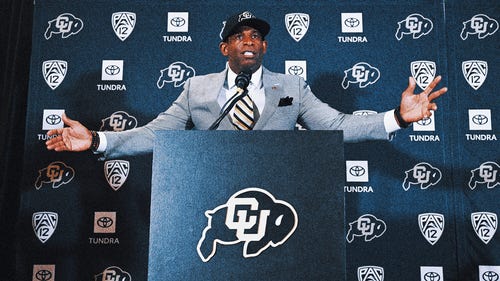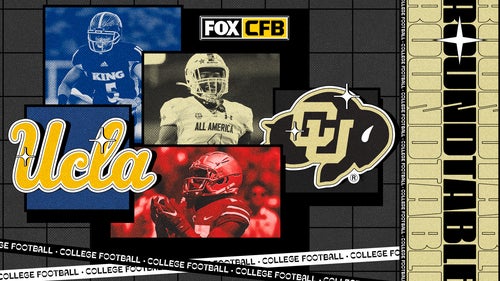

Michigan State's hope: Can Mark Diethorn steer program to calm waters?
Around the midway point of a 32-minute news conference to preview his team's spring scrimmage last month, Michigan State head coach Mel Tucker closed his eyes, pursed his lips and nodded his head in response to a question he almost certainly knew was coming.
Two weeks earlier, a report from Spartan Tailgate had made public Tucker's intention to move on from both general manager Saeed Khalif, who served as executive director of player personnel and recruiting, and Jensen Gebhardt, the program's recruiting operations coordinator. Both men were approaching the end of their respective contracts, and Tucker opted not to renew them. A third cog in Michigan State's recruiting wheel — director of community and high school relations Thomas Wilcher, who previously coached at prospect powerhouse Cass Tech in Detroit — also departed.
Tucker's overhaul of the recruiting department invited further criticism of a program that was already showing signs of unrest less than a year after winning 11 games. As the losses mounted in 2022, heinous videos of the postgame attacks on rival players in the Michigan Stadium tunnel last October led to criminal charges for seven players, including one felony count of assault for cornerback Khary Crump for weaponizing his helmet. Eight players decommitted from Michigan State during the 2023 recruiting cycle, four of whom were four-star prospects. Early returns on the 2024 class suggested the Spartans were sinking toward their worst ranking of the Tucker era while Big Ten rivals Michigan, Ohio State and Penn State sat among the top six nationally.
"We're in the process right now of looking to fill that recruiting position and then other positions underneath that," Tucker said on April 10 in reference to Khalid's overarching role.
"Recruiting is critically important," he continued, "so the people that we hire in those positions are going to be huge hires for us."
Over the next few weeks, Tucker acted on a recommendation from director of football operations Ben Mathers to select Mark Diethorn, 37, as the man to guide Michigan State's personnel department toward calmer waters. Mathers and Diethorn (pronounced DEE-thorn) had overlapped for several years at Pittsburgh and remained friends after their paths forked to Michigan State and Virginia Tech, respectively. Tucker named Diethorn his executive director of player personnel and recruiting on May 1.
The hire connected a head coach searching for stabilization with a recruiting specialist in need of revitalization. A caffeine-guzzling self-starter, Diethorn had climbed the ranks from volunteer assistant to head of his own Power 5 department despite never playing college football. He ran recruiting at Pittsburgh (2015-17) and Virginia Tech (2018-21) on a steady diet of Red Bull and round-the-clock commitment, so obsessed with minor details that colleagues hounded him to eat better and sleep more. The seven signing classes Diethorn oversaw finished with an average ranking of 42nd nationally and seventh in the Atlantic Coast Conference. After leaving the Hokies, he spent most of the last 17 months recovering from the mental and physical burnout of an unsustainable work rate.
"I emptied the tank, kind of, that last year or so," Diethorn said in an interview with FOX Sports. "And I was at the point where I needed to step back and just kind of get recharged a little bit."
Now Diethorn is embarking on arguably his steepest climb yet as the challenges in East Lansing intensify. Starting quarterback Payton Thorne (Auburn) and No. 1 wide receiver Keon Coleman (Florida State) both entered the transfer portal the day before Diethorn's official introduction. Two weeks later, the top recruit in Tucker's class of 2024 — four-star cornerback Jamari Howard (No. 104 overall, No. 12 CB) — decommitted before Diethorn had found a place to live.
Each setback made it harder and harder to believe the Spartans reached the College Football Playoff in 2015. There are plenty of chores to be done for a workaholic like Diethorn.
"He's very organized and has a thorough process for evaluating players and managing a roster," Tucker said in a press release. "I'm excited for Mark to hit the ground running and make an impact on our program."
*** *** ***
Sixteen years ago, in 2007, Diethorn's graduation from Virginia Tech coincided with the Great Recession. With degree in hand, Diethorn returned home to Belle Vernon, Pennsylvania, the Pittsburgh suburb where he was raised, and delighted his parents by parlaying his degree in business information technology into a job with PNC Financial Group at an otherwise difficult time.
But Diethorn tired of the corporate life rather quickly. He'd fallen in love with football during his years at Virginia Tech and longed for the chance to be involved with the sport professionally, though in what capacity he wasn't sure. He spent his lunch breaks writing letters to every college program and professional franchise pleading for some kind of entry-level position. The only response came from the late Ron Hughes, a college scouting coordinator for the Pittsburgh Steelers.
"I was thankful for him to call," Diethorn said. "He was like, ‘Hey, you need to get into the college route. The NFL is not going to bring somebody in with no experience. College, maybe, you can get your foot in the door.'"
His parents were skeptical. Nobody in the family was connected to football — Diethorn's father worked for a gas company; his mother was a high school art teacher — and they questioned their son's proposal of leaving his job for an ill-defined foray into the sport he quit in ninth grade. Diethorn himself was uneasy about taking out a loan to pay for graduate classes. His only plan was to enroll at a football powerhouse and figure the rest out later. He got accepted into the sport management program at Florida, where then-head coach Urban Meyer won the national title in both 2006 and 2008.

Ben Mathers (left), now Michigan State's director of football operations, crossed paths with Diethorn at Pitt.
Anything and everything got wedged into Diethorn's two-door sedan, a beat-up BMW from 1992 that once served as his high school transportation. He drove 15 hours from Pittsburgh to Gainesville with a goal of shimmying his way into Meyer's world. Waiting for him on the other end was an apartment he'd secured sight unseen on Craigslist.
"You start to get a little cold feet whenever you see the loan papers come," Diethorn said.
On the advice of a faculty member, Diethorn accepted a minimum-wage job in the student-athlete academic center because football staffers roamed the building with recruits. It was there that Diethorn met Mark Pantoni, the recruiting program coordinator on Meyer's staff, and talked his way into a volunteer position designing mailers, stuffing envelopes and sorting through bins of unsolicited DVDs from high schoolers across the country. Over time, his role expanded to include assisting with on-campus visits.
The seriousness with which Florida approached recruiting originated from Meyer, who Pantoni said spent more time texting prospects than anyone else, and radiated through the program. Meyer established a culture in which "everything in the building revolved around recruiting," Pantoni explained during an interview with FOX Sports. "You stopped everything you're doing for recruiting."
While incubating in that environment, Diethorn contributed to a 2010 recruiting haul featuring five of the top 25 players in the cycle and 22 blue-chip prospects. Florida's class was ranked No. 1 in the country by 247Sports, ESPN and Scout as other staffs took notice of what Meyer and Pantoni accomplished. The rising tide did, in fact, raise all ships — Diethorn included.
"He was a grinder," said Pantoni, who followed Meyer to Ohio State and is now the Buckeyes' general manager of player personnel. "He took direction well, put his head down and went to work. I fully trusted him."
*** *** ***
With social media and cell phones still in their infancy, recruiting departments were light on manpower as Diethorn completed his second season at Florida in 2010. The trust and experience he was earning were invaluable — "It just changed the whole trajectory," Diethorn said of his career — but two years spent volunteering in the football offices and working low-paying jobs at night were doing little to replenish his bank account. He angled for a move home to Pittsburgh where living with family members would lessen the financial burden.
Diethorn called in a favor to land another volunteer role in the one-man recruiting department at Pittsburgh, where head coach Paul Chryst was shepherding the program from the Big East to the Atlantic Coast Conference. With the Panthers, Diethorn worked a more traditional job during the day and spent his evenings in the football office. Sometimes, he never went home and drove directly to work the next morning. (It's a habit he still hasn't quite kicked: Diethorn has spent the first few weeks in East Lansing sleeping in his office while continuing to search for an apartment.
Year over year, Chryst promoted Diethorn from volunteer to graduate assistant to assistant personnel director before extending an invitation to join his new staff at Wisconsin. The incoming coach, Pat Narduzzi, who spent the previous eight seasons as Michigan State's defensive coordinator, convinced Diethorn to remain at Pittsburgh by elevating him to director of recruiting. Diethorn was 28.
"For so long in my 20s it was all about me," Diethorn said. "Am I getting noticed? Am I doing enough? What can I do for myself to make myself more valuable? But then as you get into that (director) role, it's about the people under you and trying to help them develop.
"With Coach Narduzzi, he had a great structure (that) he brought, really, from Michigan State. And I bought into that as a new way of life, you know? He had a manual and a plan for everything."

Diethorn says he learned a lot about structure from former Pitt coach Pat Narduzzi. "I bought into that as a new way of life, you know?" (Photo courtesy of Mark Diethorn)
Part of that plan included allowing Diethorn to complete a summer internship with the Pittsburgh Steelers, who share football offices and a practice facility with the university. Diethorn shadowed general manager Kevin Colbert as the scouting and personnel departments reassessed the Steelers' roster. Colbert and his staff discussed the physical attributes and character traits they coveted at each position.
It was the first time Diethorn had been formally trained to evaluate players. He leaned on that skill set in his roles at Pittsburgh, Virginia Tech and, now, Michigan State as recruiting staffs have assumed the responsibility of screening prospects before film is distributed to coaches.
Diethorn's time with the Steelers also informed his understanding of how a personnel department should be structured, a hierarchy he's currently borrowing to build his staff of roughly a dozen full-time employees in East Lansing. There will be four leadership roles beneath Diethorn, with each one overseeing additional staffers:
- A director of player personnel whose primary focus is high school prospects.
- A director of recruiting whose area of emphasis is on-campus recruiting, the admissions process and organizing official visits.
- A director of scouting responsible for tracking the transfer portal year-round.
- A creative director tasked with producing videos, organizing photo shoots and explaining to prospects how their individual brands will be grown.
"What I'm coming in and able to hire is outstanding," Diethorn said. "Talk about being competitive, I mean, that's one of the things about Michigan State, I feel the support. When I got to Virginia Tech, there was three of us."
*** *** ***
Slowly but surely, the recruiting department at Virginia Tech expanded. Diethorn had been wooed to his alma mater by the chance to build something fresh after six seasons at Pittsburgh, and together with John Iezzi, the director of recruiting, they brought anyone who had something to offer under their umbrella: from former players and coaches to student-assistants and youthful industry talents.
Diethorn believed Alex White to be the latter. White was a 21-year-old female short on experience but long in promise, an archetype — professionally speaking — of Diethorn himself when he knocked on doors at Florida. Pantoni had taken a chance on him with the Gators in 2009, and Diethorn wanted to pay it forward. He hired White as Virginia Tech's director of on-campus recruiting in the summer of 2020.
"He went above and beyond to make sure not only that I could succeed in the role that I had," said White, who is now the director of recruiting at North Carolina, during an interview with FOX Sports, "but that I also had the opportunity to grow my role through, or past, what had typically been male-only responsibilities for a football department."
People who worked with Diethorn at Virginia Tech said his willingness to hire and educate colleagues with non-traditional backgrounds became a core principle for the department. They referenced a program Diethorn created that taught students how to watch film should they wish to pursue a career in scouting. He always offered to pick up the phone as a reference when outside opportunities opened. Today, Diethorn takes pride in the 15 people he hired or mentored at Virginia Tech who have full-time roles in either college football or the NFL.

At Virginia Tech, Diethorn embraced a willingness to hire and educate colleagues with non-traditional backgrounds. (Photo courtesy of Mark Diethorn)
Some of those former colleagues cited specific examples of how Diethorn advanced their careers. Jeron Gouveia-Winslow, a former Hokies' linebacker, remembered Diethorn easing his transition from coaching to recruiting by setting aside time to explain the intricacies of roster management in the Power 5. Beau Davidson, who is now the director of player personnel at Georgia Tech, recalled Diethorn teaching him how to evaluate prospects and utilize key recruiting databases. White benefited from Diethorn including her in film sessions with coaches.
"He's a great worker, he's a great evaluator, but he's also a great developer of people, you know?" said Adam Lechtenberg, a former Virginia Tech assistant and the head coach at Central Connecticut State, during an interview with FOX Sports.
The result was a working environment Diethorn's employees largely enjoyed, from his envelope-stuffing parties with a skeleton crew at Virginia Tech to the self-deprecating video he distributed of a successful search for Red Bull at the height of the pandemic.
Staff meetings scheduled for an hour would routinely double or triple in length because of Diethorn's love for storytelling — a gift complete with voice impressions and mimicry. Once, after Diethorn was forced to quarantine, the ensuing film session lasted seven hours without a break because he unloaded "all of the storytelling and all of the jokes he wanted to tell over those 10 days," White said.
"I don't know if you remember the old SNL skits of Bill Brasky," Davidson said in an interview with FOX Sports. "That's a Mark story."
*** *** ***
But pouring so much of himself into the job caught up with Diethorn around the time Virginia Tech head coach Justin Fuente was fired late in the 2021 season. By then, Diethorn was downing four cans of Red Bull per day and working unfathomably long hours. There were days, White said, when Diethorn didn't eat.
"I literally yell at him all the time because he needs to take better care of himself," White said.
Fuente's replacement, former Penn State defensive coordinator Brent Pry, offered Diethorn a chance to stay as one regime transitioned to the next. Diethorn, who is unmarried and has no children, politely declined. He had time remaining on his contract and returned to his home in Pittsburgh for a chance to "step back and just get myself aligned."
The first year away from football was about regaining control of his life. Diethorn said he overhauled his diet, weaned himself off Red Bull and lost weight through regular exercise. He spent plenty of time with family and crossed two items off his bucket list by attending WrestleMania and The Masters with his brother. Former colleagues received pictures of Diethorn's meals as proof he was finally eating, but anyone who called with job opportunities was graciously asked to try again in 2023.
Which is not to say Diethorn divorced himself from football — he borrowed a friend's subscription to Pro Football Focus to continue watching film. The introduction of both the transfer portal and Name, Image and Likeness had radicalized the way programs were managing their rosters, and Diethorn visited four Power 5 schools to learn about operating within these new arenas.
And then Mathers called about the opening at Michigan State, where Tucker is under fire amid a stream of negative headlines. To Diethorn, the program's framework and resources were of greater importance than what he described as the "outside perception" of what's happening in East Lansing. Mathers vouched for Tucker, and Diethorn trusted the word of his former colleague.
He cracked a Red Bull and signed on the dotted line to end a 17-month hiatus.
"This is a place that you feel confident you can get on the phone with any kid in the country," Diethorn said. "And I see it just looking at our (recruiting) board and just going through these first couple weeks with who our coaches are talking to. It's like, ‘Oh, wow, we're in on that guy? Let's go!'
"The brand is strong and there's recent success, which is what resonates with the kids."
Michael Cohen covers college football and basketball for FOX Sports with an emphasis on the Big Ten. Follow him on Twitter at @Michael_Cohen13.








.jpg?downsize=56%3A*)































































.jpg?downsize=56%3A*)












































.jpg?downsize=56%3A*)
















.jpg?downsize=56%3A*)















